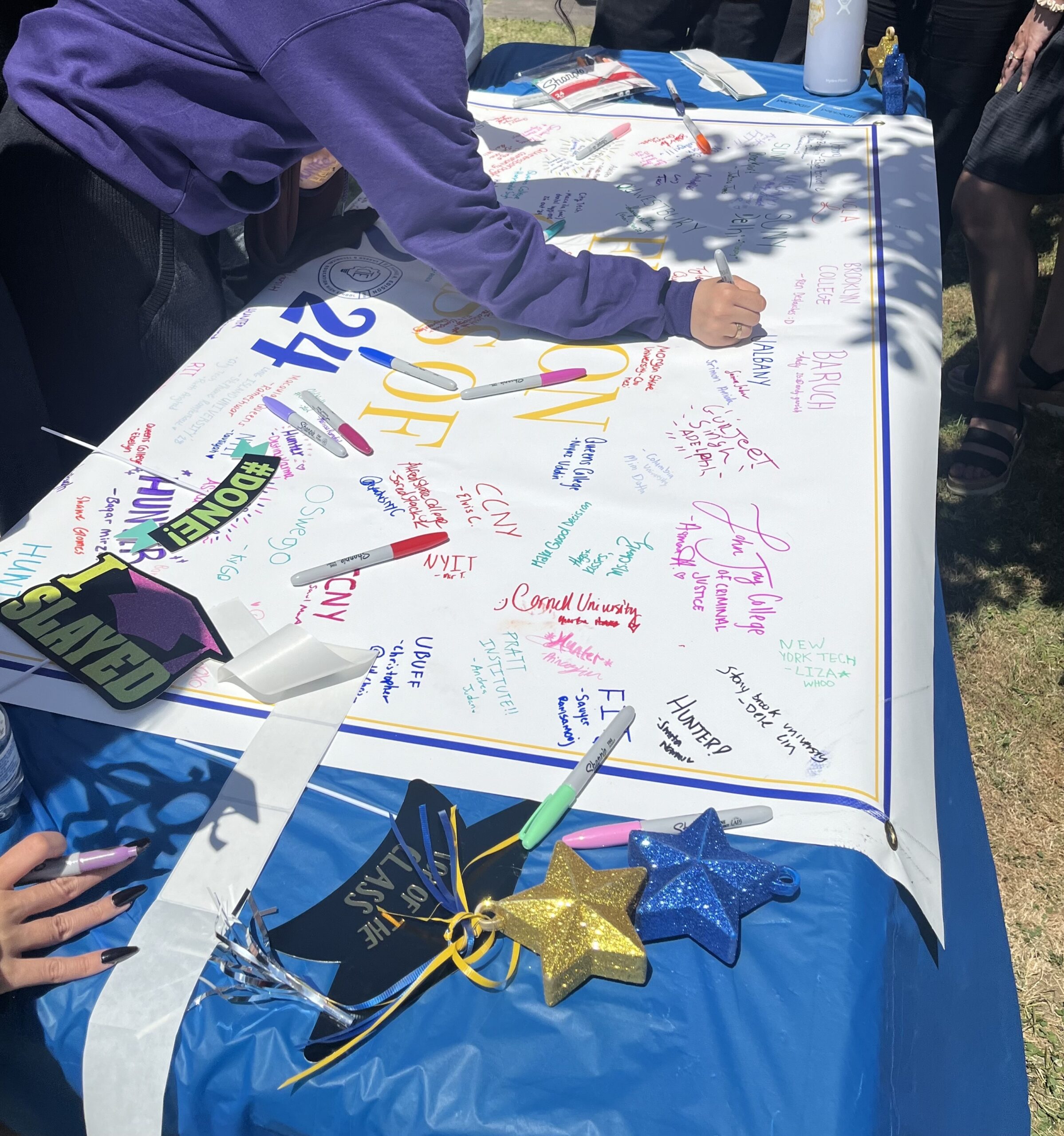The new Thomas Edison High School hydroponics lab allows students to connect classroom science to real-world experiences.
Originally used by the culinary program, the newly installed lab will now support science instruction. Mr. Ojeda, who approved the project, appreciates the opportunities it provides and is grateful for the hard work of the teachers and Ms. Triola.
 “I really got to give credit to Ms. Triola and the teachers who are the ones who actually were able to set it up,” Mr. Ojeda said. “So I just want to shout them out because they did the heavy lifting and once it was delivered, then the teachers really took over by meeting with the NYSunWorks staff on how to actually cultivate the produce.”
“I really got to give credit to Ms. Triola and the teachers who are the ones who actually were able to set it up,” Mr. Ojeda said. “So I just want to shout them out because they did the heavy lifting and once it was delivered, then the teachers really took over by meeting with the NYSunWorks staff on how to actually cultivate the produce.”
Edison’s science assistant principal, Ms. Triola explained, the lab was implemented into environmental science classes to best align with the subject’s focus on ecosystems and sustainability.
“We decided to implement this hydroponics curriculum into the environmental science because it fits more with the environment, the living plants,” said Ms. Triola.
She also mentioned that students take part in every stage of the process from planting seeds and feeding the plants to pruning, measuring growth, and taking detailed observations.
“They interact, hands on, by harvesting, by trying to prune them, and all the experiments that they do, like in terms of taking their weight, measuring the growth, and all the qualitative observations that involve touching and feeling the texture of the plants,” Ms. Triola said.
Mr. Raimo Hansen, one of the environmental science teachers at Edison, sees hydroponics as a powerful tool for connecting students to the science behind sustainability.
“It gives students a chance to do hands-on work with something that can benefit the environment,” Mr. Hansen said.
Students learn to manage hydroponic systems, monitor water quality, and develop an understanding of plant needs during the growth cycle, through the lab.
Mr. Hansen highlighted how hydroponics relates to lessons on water conservation, efficient farming, and climate-controlled production of food.
“Hydroponics is a way of growing food that doesn’t use as much land as conventional farming. It also is more efficient with water than conventional farming and conventional farming, when they water the crops, you lose a lot of water due to infiltration into the ground and also evaporation into the air. With hydroponics, you have a reservoir system that recycles the water that it keeps going to the plants over and over again, and you know, it’s a way to grow food. You can also get a higher yield because you don’t have to worry about pests. You can grow any time of the year. You see, you can have multiple crops, multiple seasons, and you know, you’re growing it in a climate controlled environment,” Mr. Hansen said.
Mr. Raymond Liu, another environmental science teacher here at Edison, thinks that the lab makes science more exciting to learn.

“But with hydroponics, it’s a topic that allows the students to get a lot more hands on, and get to see that growth and the actual experience of growing plants in a hydroponic system,” said Mr. Liu.
While learning how to care for plants, students also look into the advantages and disadvantages of hydroponic farming instead of conventional farming. Liu explained that the lab highlights sustainability by illustrating how a smaller space can be used to produce a lot of food with modern technology.
“They get to see all these crops develop and grow and then actually eat and enjoy a lot of the crops that we’ve grown. That way they can see the fruits of their labor,” said Liu.
“By working in rotating small groups, students get direct experience that builds teamwork, curiosity, and responsibility. The students themselves were overjoyed,” said senior Sulaman Navid. “I’m pretty happy about it. It makes the class more interesting. Whenever, we’re learning about the subject, we can always look around the classroom and it’s in our vision.”
Through this new lab room, students will be able to explore new opportunities in their future. From the teaching of hydroponics, certain students like Amisha Mahadeo would make their own hydroponics garden at home.
“I found it interesting … like the difference between hydroponic farming and conventional farming is interesting to learn about,” Mahadeo said, such as the NFT system, which reuses its water supply.
These students were able to get this opportunity because of Senator Stavisky, who used to be a teacher here. Her history with Edison was the reason for the funding, given in memory of one of the teachers who used to work here.
“So I said I want to do something for Thomas Edison. That’s when I provided some funding for in memory of Junior high school teacher Mark Hagen, but also NYSunWorks got in touch with us,” Senator Stavisky said.
Since she attended high school here, she also knows the major differences that used to exist.
“There were two women in the, between the English and Social Studies Department And very few women in the school But you were one of them. I was one of them,” Senator Stavisky said.
Senator Stavisky enjoys the opportunities the hydroponics lab has to offer, and since the teachers are just as helpful, it’s not just the hydroponics lab but also the teachers—and the principal—who make it great.
“It gives them a new area to explore. When I was in college, I took all kinds of courses which never really Materialized into a job or to it, but it gives you a broader education and I think The opportunities are terrific,” the Senator said. “Take advantage of everything it has to offer. Teachers want to help. They’re nice. They’re friendly Principal is amazing, I think and They’re there to help explore and take advantage of what Edison is offering.”
This new advantage that Edison now has, is incredible especially because it allows students to learn different things and ways.

“So again, I think that too many times when we teach courses, we’re talking about theory, we’re talking about things that are not necessary in action,” Mr. Ojeda said. “So the kids are actually doing a crossover where they actually get to grow plants in a hydroponic setting so they can make the connection. And sometimes I always think about our students, some are visual learners, and I know I’m a visual learner, so I’m all about seeing it in action.”
Now with all this new materials, the action can get started. Thomas A. Edison CTE High School continues to grow its education, with the educational staff ready for new innovations for the students.
“I’d like to say to students is that a lot of the cool things that happen at Edison happen in collaboration and at the forefront, it’s usually the teachers. So I’m thankful for them taking on new initiatives and trying new things because at the end of the day, students benefit,” Mr. Ojeda said.










